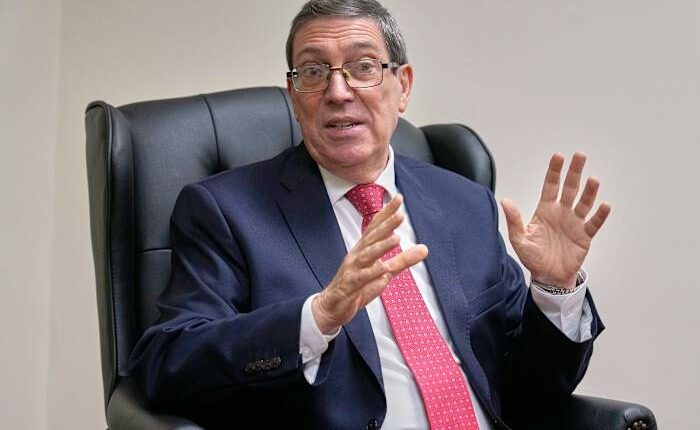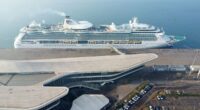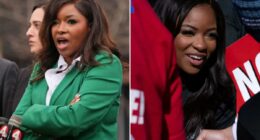Share this @internewscast.com

NEW YORK – Recent U.S. actions in the Caribbean stem from Secretary of State Marco Rubio’s “personal” agenda against the area, according to Cuba’s top diplomat, indicating that his American counterpart is increasingly advocating for policies that diverge from President Donald Trump’s declared peace mandate.
Cuba’s Foreign Minister Bruno Rodríguez Parrilla shared with The Associated Press that Cuba had hoped for a shift away from the prolonged antagonism with the United States upon Trump’s return to office in January. However, he stated, Rubio, born to Cuban immigrants, seems intent on intensifying a “maximum pressure” strategy against Havana.
“The current secretary of state has no personal experience or connection with Cuba,” Rodríguez conveyed in an interview with The Associated Press on Tuesday. “Yet, there is a very personal and corrupt agenda being pursued, seemingly ignoring U.S. national interests in favor of an extremist strategy.”
No comment was provided by the State Department. Rubio and other U.S. authorities have justified their stern stance towards Cuba, criticizing its leadership for maintaining a dictatorial regime.
“The U.S. will consistently advocate for the human rights and freedoms of Cubans, asserting that dictatorial regimes are unwelcome within our hemisphere,” Rubio stated in a declaration in July.
The path is delicate for Cuba when it comes to the US
The foreign minister, along with other Cuban officials, has been navigating diplomatic discussions with the Trump administration in hopes of ending a six-decade U.S. economic embargo, which, while not toppling the government, has led to widespread energy shortages, food scarcities, and inflation.
In public statements and speeches, officials have strayed away from directly criticizing Trump for the series of aggressive actions his administration has taken against Cuba in the first eight months of his second term. Those include restoring a gamut of restrictive economic sanctions that were eased during the terms of Democratic Presidents Barack Obama and Joe Biden. In the days before leaving office, Biden had moved to lift the U.S. designation of Cuba as a state sponsor of terrorism.
Trump moved the country back to the list the day after his inauguration. The U.S. has also made Cuba one of seven countries facing heightened restrictions on visitors and revoked temporary legal protections that had shielded about 300,000 Cubans from deportation. The administration has also announced visa restrictions on Cuban and foreign government officials involved in Cuba’s medical missions, which Rubio has called “forced labor.”
Rodríguez, who has served as foreign minister since 2009, blames these escalations against Cuba and the recent ones against Venezuela squarely on the “bipolar” State Department, not the Trump White House. He added that Trump “portrays himself as an advocate of peace,” but it’s Rubio who “promotes the use of force or the threat to use force as an everyday, customary tool.”
Before being tapped as secretary of state and national security adviser, Rubio had already exerted influence over U.S. policy toward Latin America during Trump’s first term.
The former Florida senator has admitted that his interest in targeting leftist Latin American leaders has been personal. His parents are Cuban immigrants who arrived in Miami in 1956, shortly before Fidel Castro’s 1959 communist revolution. He grew up in Miami, where many Cubans sought refuge after Castro’s rise to power.
His consistent criticism of communism has helped win him support from thousands of members of the Venezuelan diaspora who made Florida their new home to escape crime, economic deprivation and unrest under Venezuelan President Nicolás Maduro and his predecessor, the late Hugo Chávez, who assumed the presidency in 1999 and began his self-described socialist revolution.
Actions in waters off Venezuela cited as aggression
The lobbying for further U.S. intervention in Latin America, which has defined much of Rubio’s quarter-century in politics, was on stark display recently when the U.S. dispatched a fleet of American warships into the waters off Venezuela after ordering back-to-back fatal strikes on alleged drug boats.
Rodríguez said that Cuba has acted in “full solidarity” with Venezuela and warned that the unusual naval buildup off South America and speculation that Trump could try to topple Maduro “could bring about unforeseeable and catastrophic consequences.” The Trump administration has said it is trying to force Cuba to stop supporting Maduro, who the U.S. says receives military and intelligence help from the Cubans.
When asked if Cuba would support Venezuela militarily if an invasion were to happen, he demurred, saying, “We do not know what the future can bring.”
But Rodríguez expressed optimism about the prospects of a less adversarial relationship with its northern neighbor and said officials continue to cooperate with Washington on several bilateral agreements, including on counterterrorism and migration.
He added, “We are fully willing, as we have always been, to begin right now, today, a serious and responsible dialogue with the current U.S. administration.”
Copyright 2025 The Associated Press. All rights reserved. This material may not be published, broadcast, rewritten or redistributed without permission.











